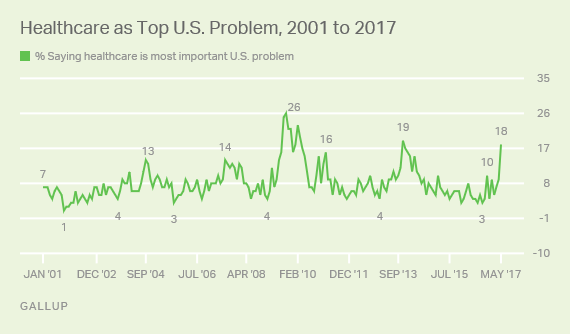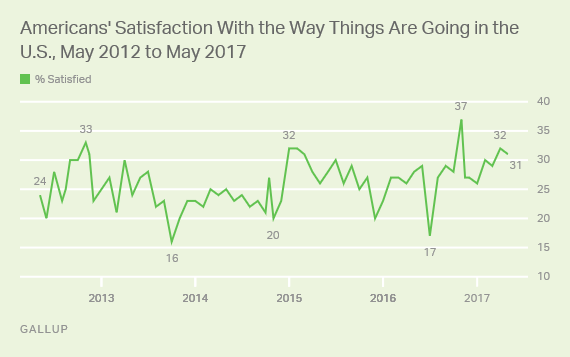
Healthcare Surges as Top Problem in US
Story Highlights
- 18% say healthcare most important problem in May
- Government dissatisfaction/Poor leadership ties healthcare for top concern
- 31% satisfied with way things are going in U.S.
WASHINGTON, D.C. -- Americans became much more concerned about healthcare this month, with 18% naming it as the most important problem facing the U.S. Mentions of healthcare tie with mentions of "dissatisfaction with government/poor leadership" at the top of the most important problems list. This is the highest percentage mentioning healthcare since November 2013, amid the troubled rollout of the government healthcare exchanges.

These results are based on a Gallup poll conducted May 3-7, in the midst of the House vote on the American Health Care Act, the replacement bill for the Affordable Care Act. That vote followed a failed effort in the House in March to bring the original version of the bill to a vote. The Senate will now act on the healthcare legislation.
The percentage of Americans naming healthcare as the most important problem hit a recent peak of 26% in August/September 2009, amid angry town-hall meetings nationwide about the Affordable Care Act. Mentions of healthcare averaged 20% from August 2009 through March 2010, when President Barack Obama signed the bill into law. After that, fewer Americans cited healthcare as the most important problem until the exchanges got up and running in late 2013. As concerns about the Obamacare website increased, the percentage naming healthcare as the most important problem was often in the teens.
Still, mentions of healthcare are lower than they were in the mid-1990s, during the Hillary Clinton-directed push for universal healthcare. At that point, they reached the upper 20s and low 30s, peaking at 31% in January 1994.
Currently, 24% of Democrats rate healthcare as the most important problem, while 14% of Republicans and 17% of independents say the same.
Dissatisfaction With Government Remains High
Dissatisfaction with government and poor leadership tie with healthcare in May as the most important problem. The 18% who mention government dissatisfaction is down slightly from 21% in April, though this issue has remained one of the top problems for the last several years.
[Open-ended]
| March 2017 | April 2017 | May 2017 | |||||||||||||||||||||||||||||||||||||||||||||||||||||||||||||||||||||||||||||||||||||||||||||||||
|---|---|---|---|---|---|---|---|---|---|---|---|---|---|---|---|---|---|---|---|---|---|---|---|---|---|---|---|---|---|---|---|---|---|---|---|---|---|---|---|---|---|---|---|---|---|---|---|---|---|---|---|---|---|---|---|---|---|---|---|---|---|---|---|---|---|---|---|---|---|---|---|---|---|---|---|---|---|---|---|---|---|---|---|---|---|---|---|---|---|---|---|---|---|---|---|---|---|---|---|
| % | % | % | |||||||||||||||||||||||||||||||||||||||||||||||||||||||||||||||||||||||||||||||||||||||||||||||||
| Healthcare | 7 | 9 | 18 | ||||||||||||||||||||||||||||||||||||||||||||||||||||||||||||||||||||||||||||||||||||||||||||||||
| Dissatisfaction with government/Poor leadership | 18 | 21 | 18 | ||||||||||||||||||||||||||||||||||||||||||||||||||||||||||||||||||||||||||||||||||||||||||||||||
| Immigration/Illegal aliens | 12 | 8 | 7 | ||||||||||||||||||||||||||||||||||||||||||||||||||||||||||||||||||||||||||||||||||||||||||||||||
| Economy in general | 8 | 8 | 6 | ||||||||||||||||||||||||||||||||||||||||||||||||||||||||||||||||||||||||||||||||||||||||||||||||
| Unemployment/Jobs | 9 | 5 | 6 | ||||||||||||||||||||||||||||||||||||||||||||||||||||||||||||||||||||||||||||||||||||||||||||||||
| Race relations/Racism | 6 | 4 | 6 | ||||||||||||||||||||||||||||||||||||||||||||||||||||||||||||||||||||||||||||||||||||||||||||||||
| Gallup | |||||||||||||||||||||||||||||||||||||||||||||||||||||||||||||||||||||||||||||||||||||||||||||||||||
After healthcare and government dissatisfaction, the next-highest-ranking issues are immigration, the economy in general, unemployment and race relations. The 7% who name immigration is down from 12% in March as President Donald Trump's plans to build a wall on the U.S.-Mexico border begin to retreat from the news.
The "economy is general" is typically one of the top-ranking issues on Gallup's list. However, the 6% who mention it now is the lowest it has been since July 2007, just before the Great Recession.
Satisfaction With the U.S. Holds Steady
Another key indicator of the national mood -- Americans' satisfaction with the way things are going in the U.S. -- is at 31% in May, virtually unchanged from April.

Satisfaction has been over 20% since August of last year, though never exceeding 37%. Satisfaction has not hit 40% since July 2005, and the majority of Americans haven't been satisfied since January 2004.
Bottom Line
Healthcare has been an ongoing public policy issue for decades, with several presidents attempting to tackle the problem of affordable coverage, dating back to Franklin Roosevelt. President Bill Clinton, along with first lady Hillary Clinton, tried to secure universal healthcare in the mid-1990s but were unsuccessful.
With the repeal of Obamacare a distinct possibility, Americans believe healthcare is one of the most important problems in the U.S. As the Senate debate over a new healthcare law wears on, this issue is likely to loom as a top-of-mind concern for months, if not years, to come.
Historical data are available in Gallup Analytics.
Survey Methods
Results for this Gallup poll are based on telephone interviews conducted May 3-7, 2017, with a random sample of 1,011 adults, aged 18 and older, living in all 50 U.S. states and the District of Columbia. For results based on the total sample of national adults, the margin of sampling error is ±4 percentage points at the 95% confidence level. All reported margins of sampling error include computed design effects for weighting.
Each sample of national adults includes a minimum quota of 70% cellphone respondents and 30% landline respondents, with additional minimum quotas by time zone within region. Landline and cellular telephone numbers are selected using random-digit-dial methods.
View survey methodology, complete question responses and trends.
Learn more about how the Gallup Poll Social Series works.
